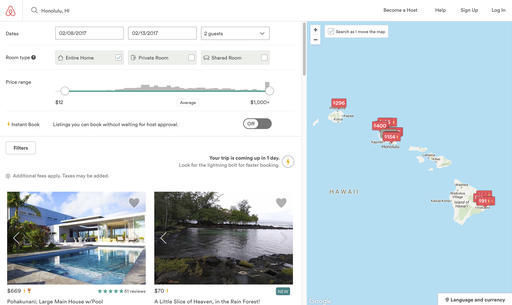LIHUE — Howard Bertenthal says he doesn’t get many bookings from his Airbnb listing of his Wailua condominiums. But the listing on VRBO, a website that books his short-term rentals, lists all the costs to his vacation rentals, he says.
LIHUE — Howard Bertenthal says he doesn’t get many bookings from his Airbnb listing of his Wailua condominiums.
But the listing on VRBO, a website that books his short-term rentals, lists all the costs to his vacation rentals, he says.
“I charge a $125 cleaning fee, security deposit of $300 and the 13.25 percent of Kauai taxes. (Visitors) know exactly what they’re getting into. They know the total,” he said. “If you were to book through Airbnb, you would see that I rent my unit for $190 a night and you would put in a request to book it. I would send you a response and suddenly it would say it’s $225 a night, roughly, because they’ve included those other three fees in the the daily rate.”
People see that as misleading, he said.
A Hawaii House committee passed two bills on Tuesday that would allow the state to collect more tax revenue from the state’s proliferating vacation rental and bed-and-breakfast properties while counties figure out how to regulate them.
The two bills would allow vacation-rental websites, such as Airbnb, to collect taxes on behalf of short-term rental operators who list their properties online. Currently, operators must pay their own taxes.
If passed, taxes collected from the websites could amount to tens of millions dollars for the state.
Bertenthal said he pays his taxes quarterly and supports the measures.
“I have no problem with that,” he said. “In fact, it probably in some ways hurts me when people see what it costs to rent my unit versus an Airbnb.”
Additionally, the measures would help to eliminate illegal short-term rental lodging and provide greater accountability for hosting platforms that materially contribute to illegal rentals.
State House Tourism Committee Chairman Rep. Richard Onishi said he’s aiming for legislation that would make sure short-term rentals are legal under state and county law.
Kauai County officials said it is too early in the session for the county to comment on the proposed bills, but officials say they are tracking measures and declining to submit testimony at this time.
But Kauai County’s planning department did offer testimony in support of a similar TVR taxation bill in the Senate (SB 1281), which requires lodging companies to register as transient accommodations broker tax collection agent.
Matt Middlebrook, public policy manager for Airbnb, wrote in testimony the company would have collected $15 million in tax revenue from vacation rental owners in 2015.
“Today I can share with you that if we had been allowed to collect taxes on behalf of our host community in 2016, we would have remitted $26 million,” he said. “Combined over the year two period, we would have remitted more than $40 million to Hawaii. We want to pay taxes, we believe that there is value to this to all parties, and we hope you will agree with us and adopt legislation allowing us to do it this year.”
However, Airbnb said in testimony that one bill that would require websites to take down rental listings that fail to comply with local laws, saying federal law does not require websites to police user postings.
The Land Use Research Foundation of Hawaii believes one of the measures “is vital to identify noncompliant short-term rental lodging operators and owners, and to collect the (transient accommodations tax) and (general excise tax) currently being avoided, but rightfully owed by them to the state.”
“HB 1470 contains more detailed and comprehensive reporting, auditing and enforcement requirements, safeguards, and other provisions, which LURF believes not only better protect the public by ensuring tax compliance and maximum tax revenue from bookings processed through host platforms, but will also effectively assist DoTax by relieving it of its duty to enforce tax compliance by individual owner/operators, and reduce its administrative costs.”
Hawaii Tourism Authority data from last year shows an increase of 7 percent of visitors who stayed in vacation homes in Hawaii last year compared to the year before. That outpaced the 3.5 percent increase in visitors staying in hotels.
The state agency said there were just over 12,000 vacation rental units in Hawaii.
•••
The Associated Press contributed to this report.


